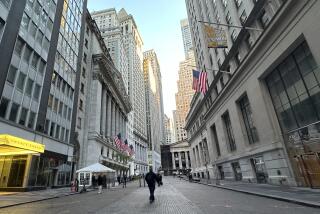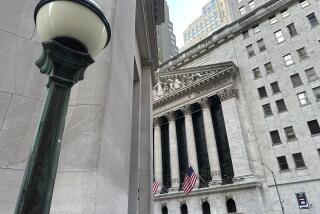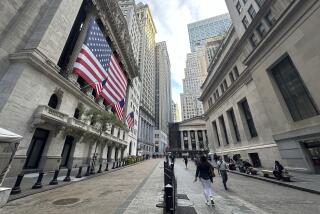Bond Yields Jump on Latest Signs of Strong Economy; Dow Ends Off 31
The bond market slumped again Friday, sending yields to their highest level since early July, amid mounting evidence that the U.S. economy’s strength will invite a credit-tightening move by the Federal Reserve Board.
In the stock market, however, prices closed only modestly lower, with many investors on vacation ahead of the long Labor Day weekend. The Dow industrial average fell just 31.44 points to 5,616.21, but it was still the lowest close in a month.
Bond yields jumped quickly in midday trading and remained at those levels through the abbreviated session, which ended early because of the holiday weekend. The bellwether 30-year Treasury bond yield closed at 7.12%, up from 7.03% on Thursday and the highest since the yield reached 7.19% on July 5.
For the week, the T-bond yield rose 0.18 point, as the continuing stream of government data pointed to a resilient economy.
There was more of the same on Friday in reports on factory orders and Midwest manufacturing activity.
The news dejected many bond investors, who had been expecting the economy to slow and yields to come down.
“The [bond] market is starting to come toward the realization that we’ve got a decent economy, not a doom-and-gloom economy,” said Michael Strauss, chief economist at Yamaichi International (America).
Shorter-term yields surged with longer-term yields Friday in a clear signal that investors expect the Fed to soon raise its benchmark short-term interest rate, the federal funds rate, from the current 5.25%.
The yield on one-year T-bills rose to 5.91% on Friday, up from 5.79% on Thursday and up sharply from 5.62% just two weeks ago.
Yet some Fed officials on Friday insisted the central bank had still not reached the conclusion that the economy’s pace warrants higher official rates.
Some analysts said next week’s data could be make-or-break for the Fed in its interest-rate deliberations. Reports next week will include a look at August’s manufacturing activity nationwide, car sales and, next Friday, employment.
For the stock market, which in July suffered its deepest pullback since 1994 on worries about slowing corporate profit growth and about the potential for a Fed rate hike, the good news on the economy is a mixed bag: It could mean better third-quarter profit growth, but if the Fed indeed raises rates, investors will see what has historically been a sell signal.
The Dow index had fought back from July’s 10% decline in recent weeks, nearly recouping all of its loss. But indexes of smaller stocks regained only about half the 20% declines they experienced in July.
On Friday action was muted despite the jump in bond yields. The Dow was off more than 60 points but cut that loss in half by the close. Still, the index fell 1.9% for the week. On the Big Board, falling stocks outnumbered winners by 15 to 8 on Friday.
The Nasdaq composite index of mostly smaller stocks lost just 3.53 points to 1,141.50 on Friday, and rising stocks had a slight edge over losers. For the week the Nasdaq index eased 0.1%.
Because trading was so slow Friday and the rest of the week, analysts said the market’s true judgment about rising interest rates won’t be rendered until next week, when many investors return from vacation.
Among Friday’s highlights:
* The rise in bond yields hurt many interest-rate-related stocks. Chase Manhattan lost 1 1/2 to 74 3/8, home builder Centex fell 3/4 to 32 1/8 and Student Loan Marketing lost 2 1/4 to 73 5/8.
Exceptions to that trend were some banks, which rose on takeover speculation after Boatmen’s Bancshares agreed to a takeover by giant NationsBank.
Bank winners included Barnett, up 1 1/8 to 65 5/8; Mellon, up 5/8 to 55 3/8; and First Bank, up 1/2 to 64 1/4.
* ValuJet jumped 1 1/2 to 12 1/2 after the discount air carrier, grounded for safety violations, won tentative approval from regulators to resume flights on a limited schedule.
* Some industrial stocks gained, perhaps on earnings optimism. Chrysler rose 7/8 to 29 1/4, railroad CSX added 5/8 to 50 5/8 and 3M rose 1 3/8 to 68 3/4.
In foreign trading, Mexican stocks fell for a third day and the peso slid as soaring U.S. bond yields and political turmoil in Mexico prompted investors to sell their holdings ahead of the Labor Day weekend. Mexico City’s Bolsa index dropped or 0.9% to 3,305.47, its lowest since Aug. 14.
Market Roundup, D4
More to Read
Inside the business of entertainment
The Wide Shot brings you news, analysis and insights on everything from streaming wars to production — and what it all means for the future.
You may occasionally receive promotional content from the Los Angeles Times.










